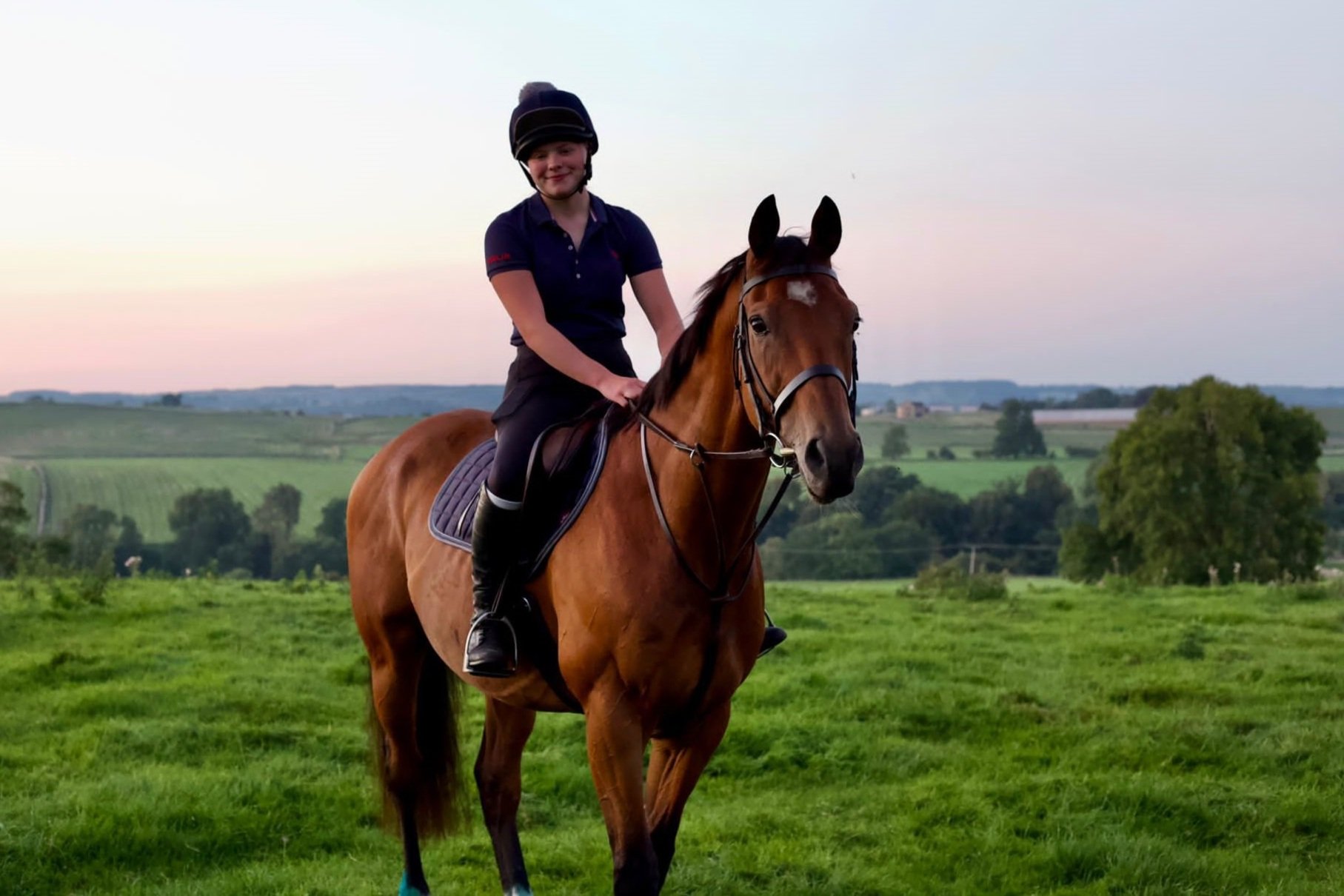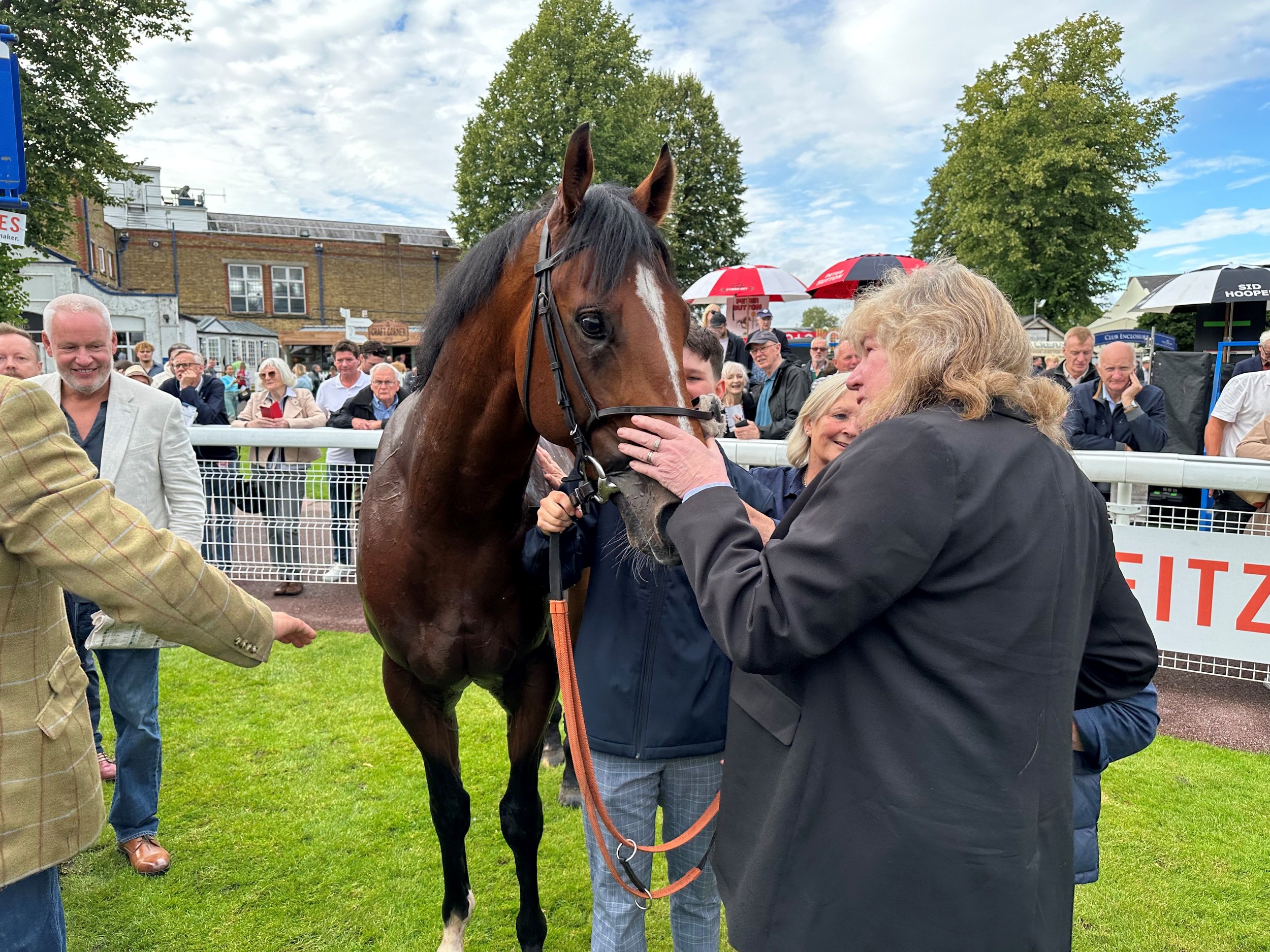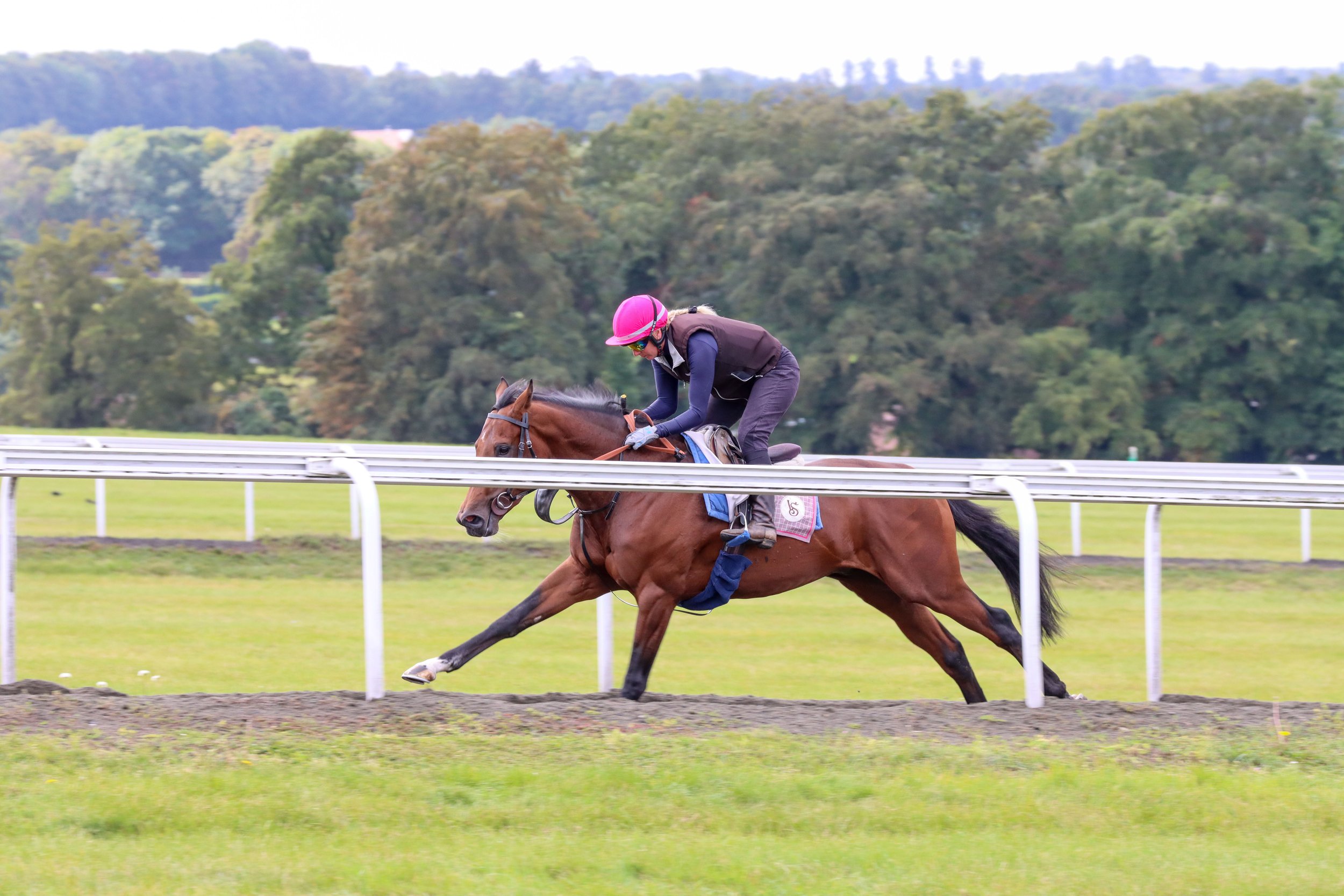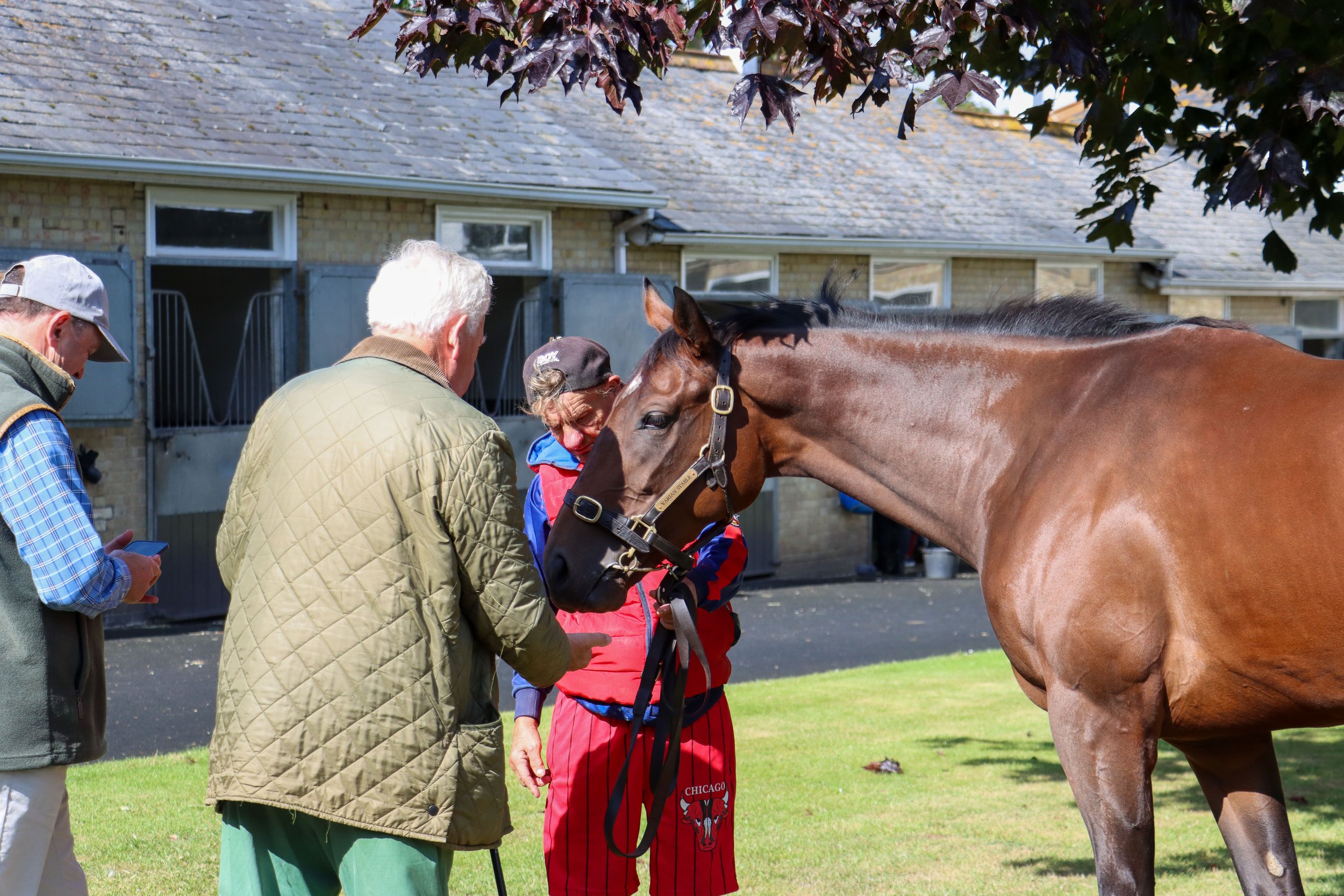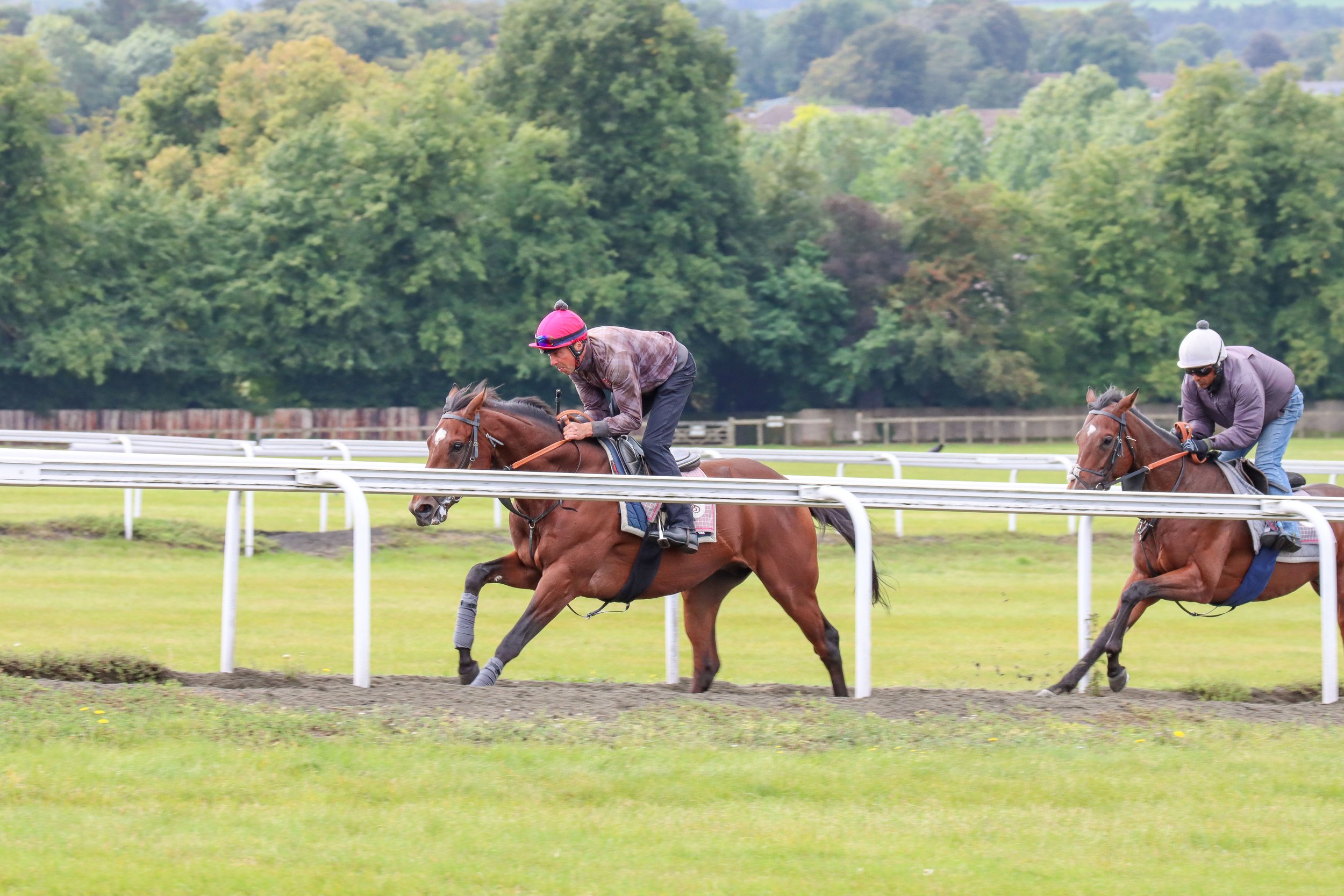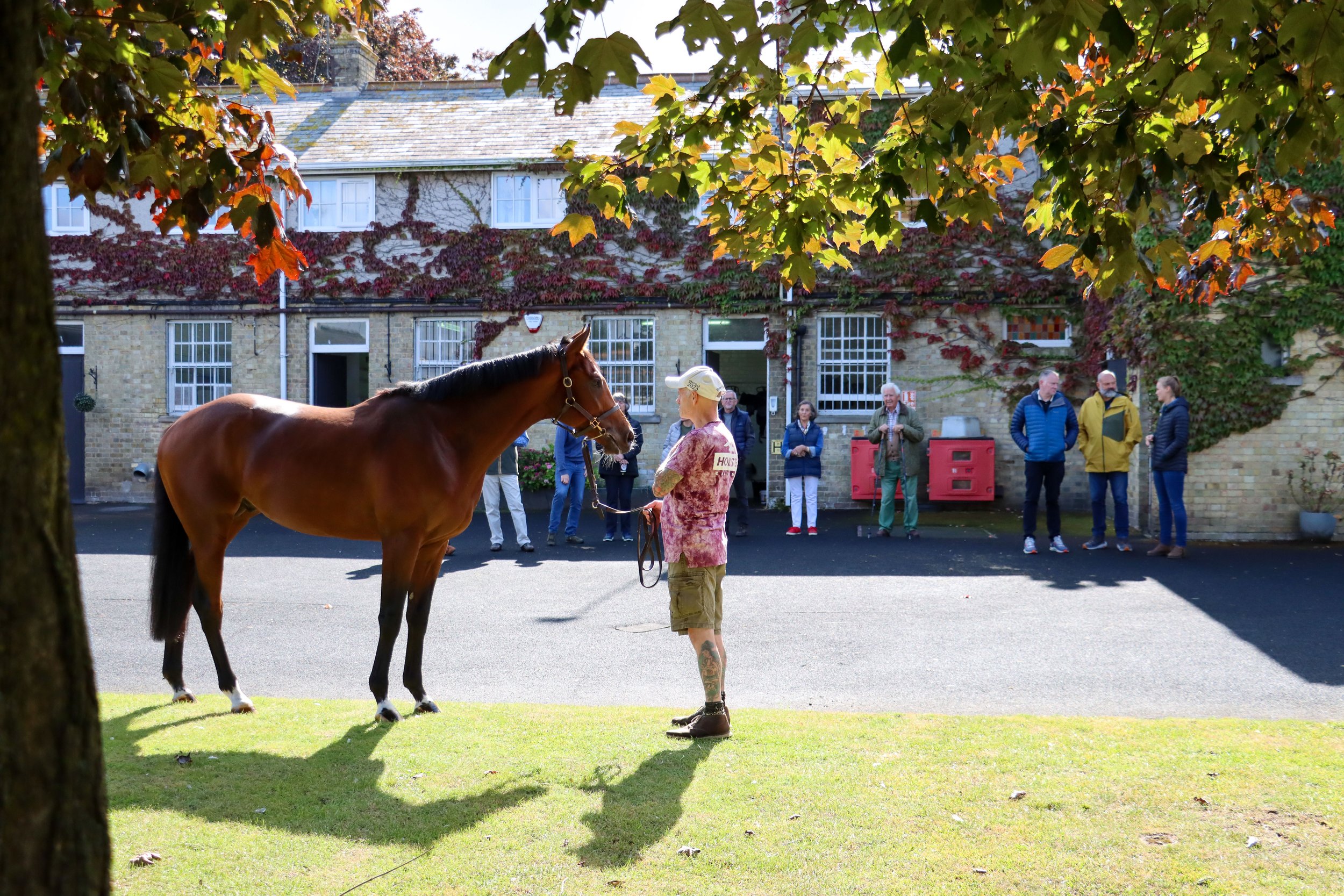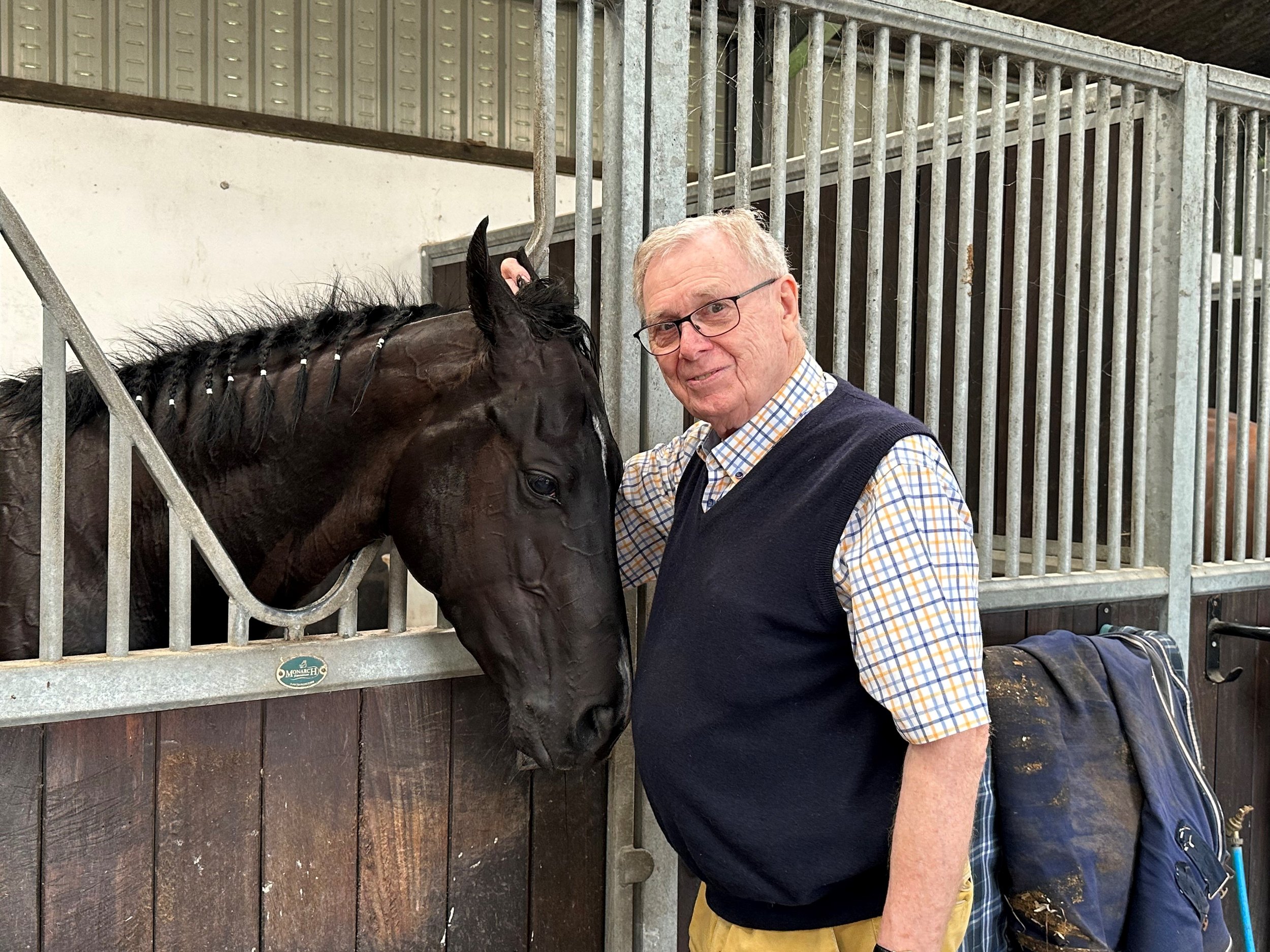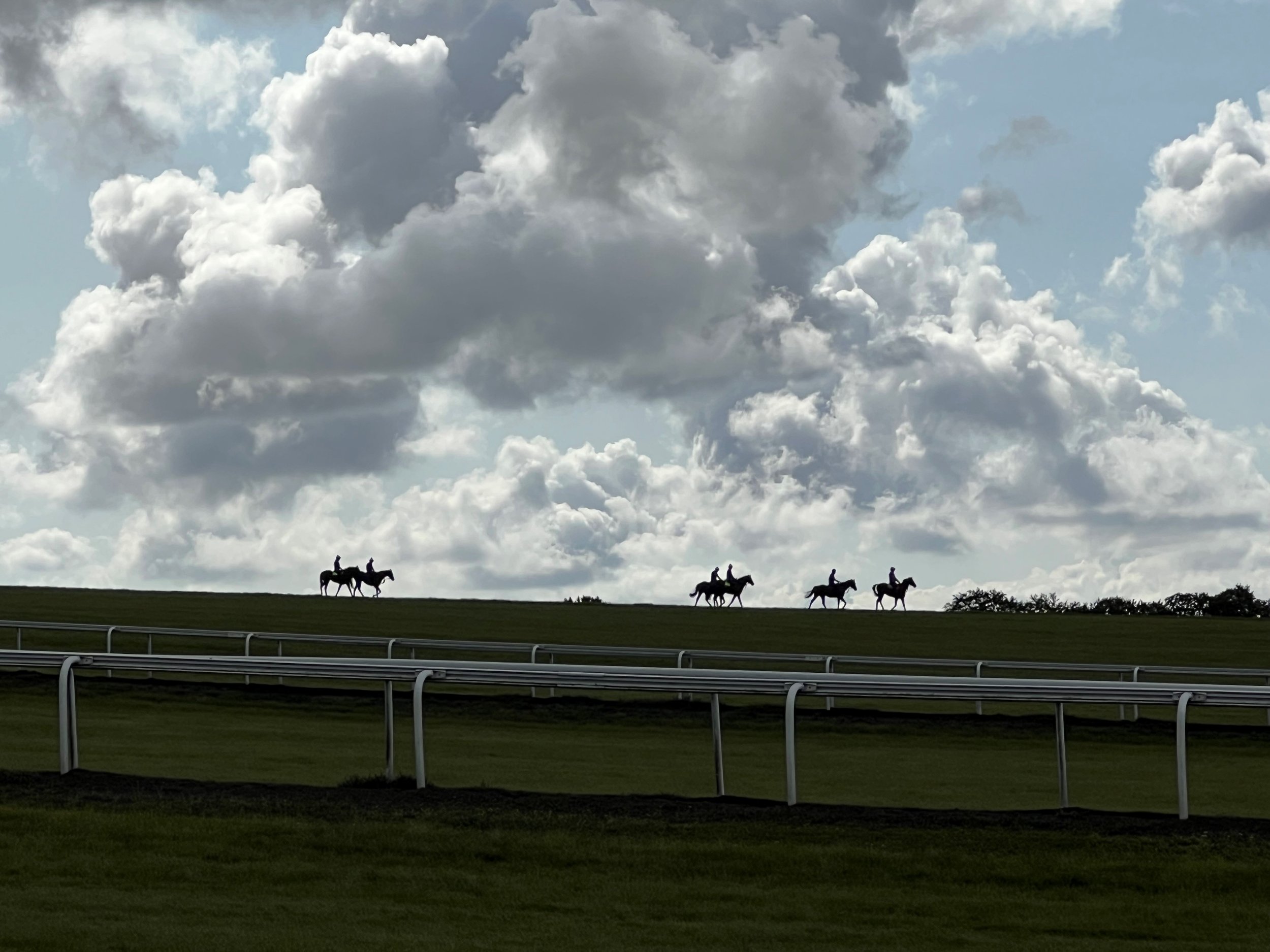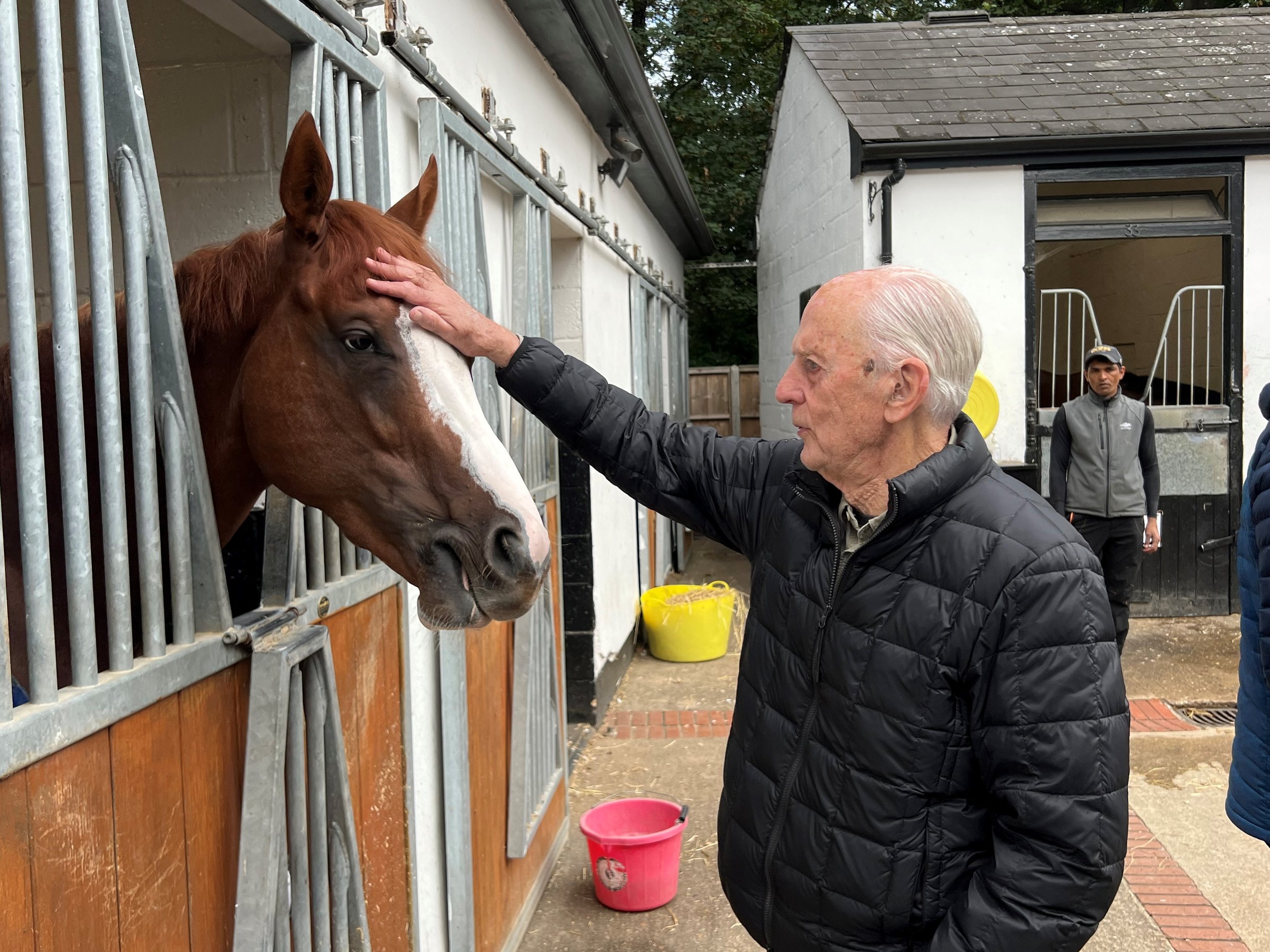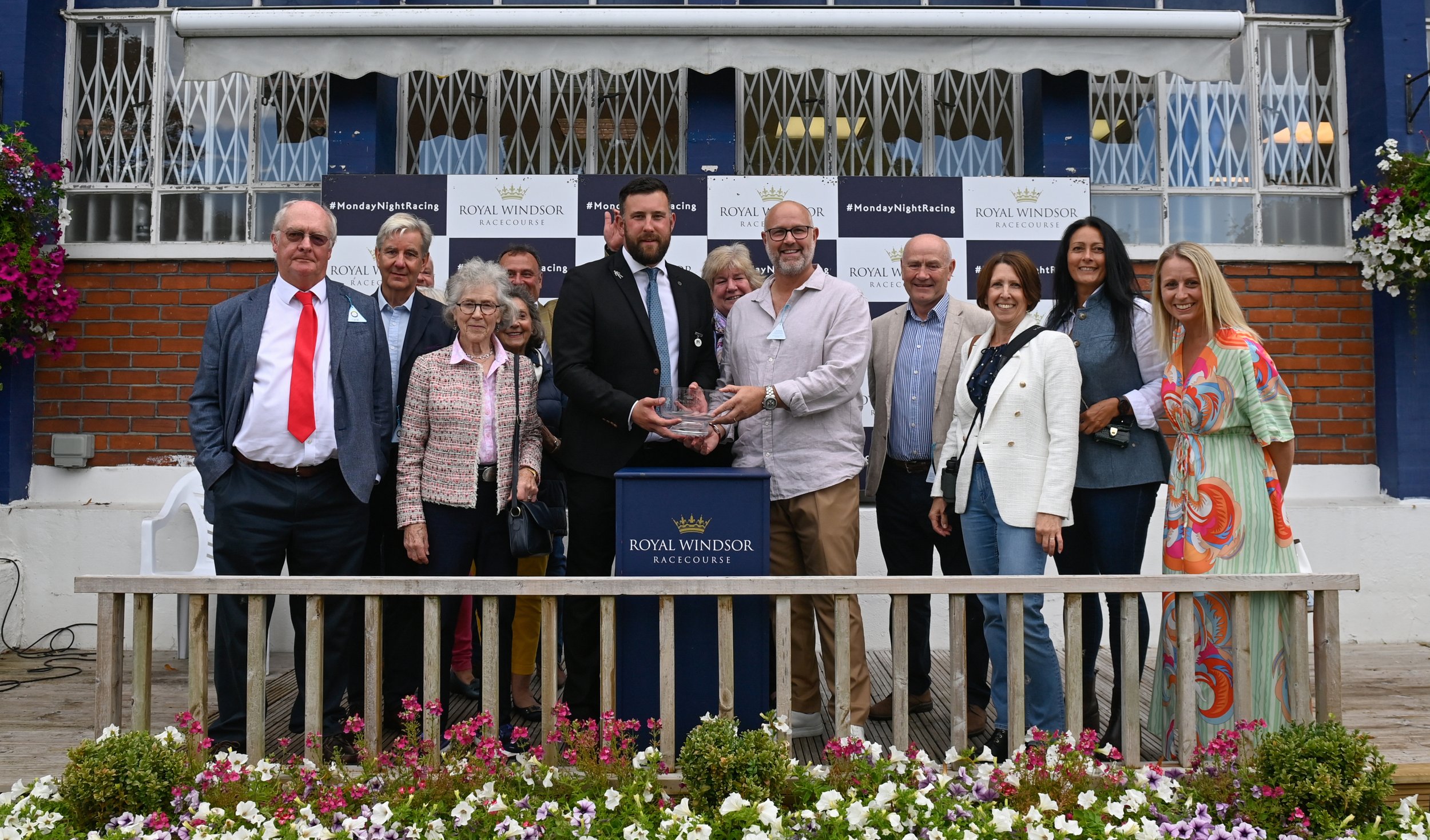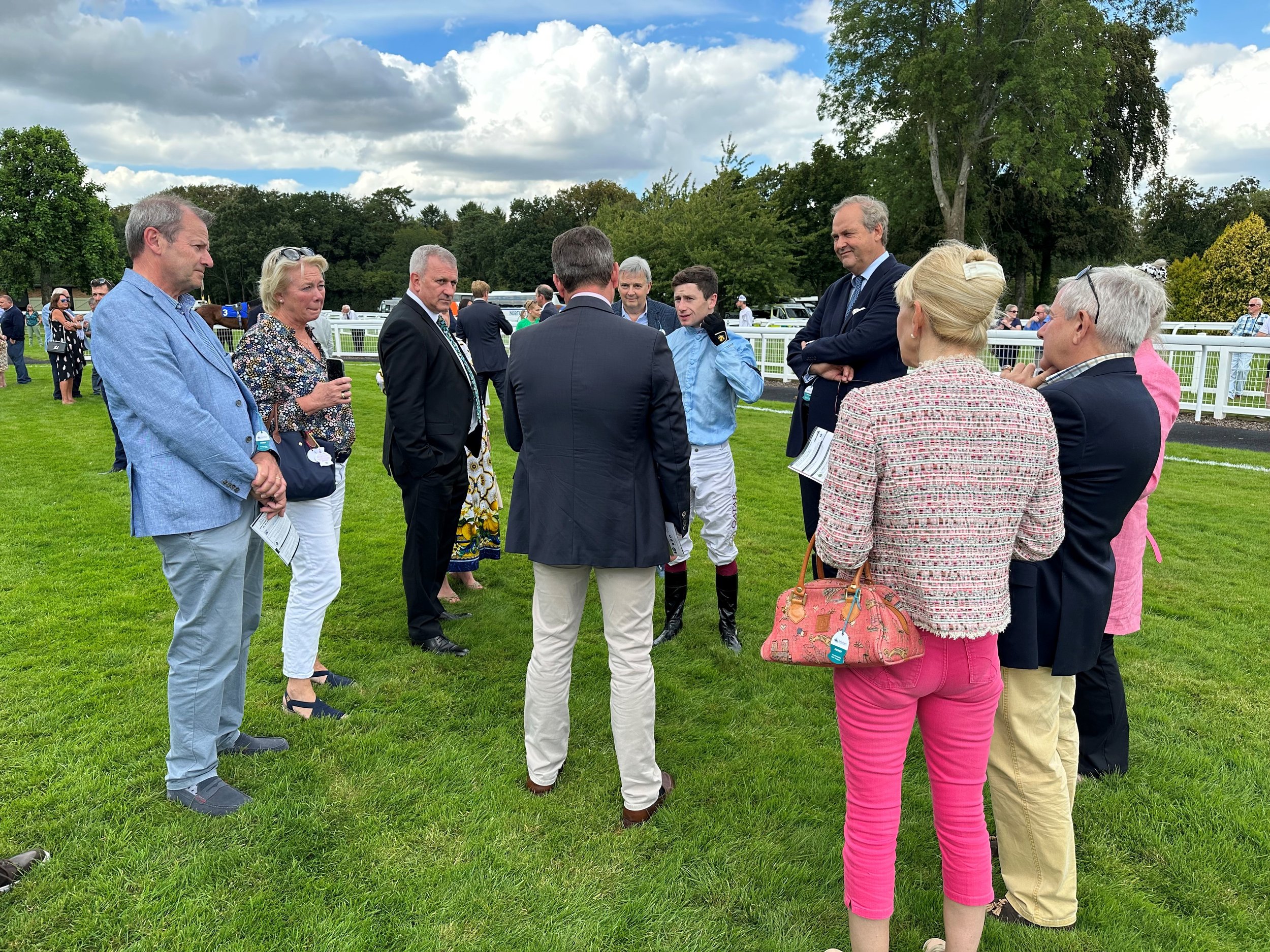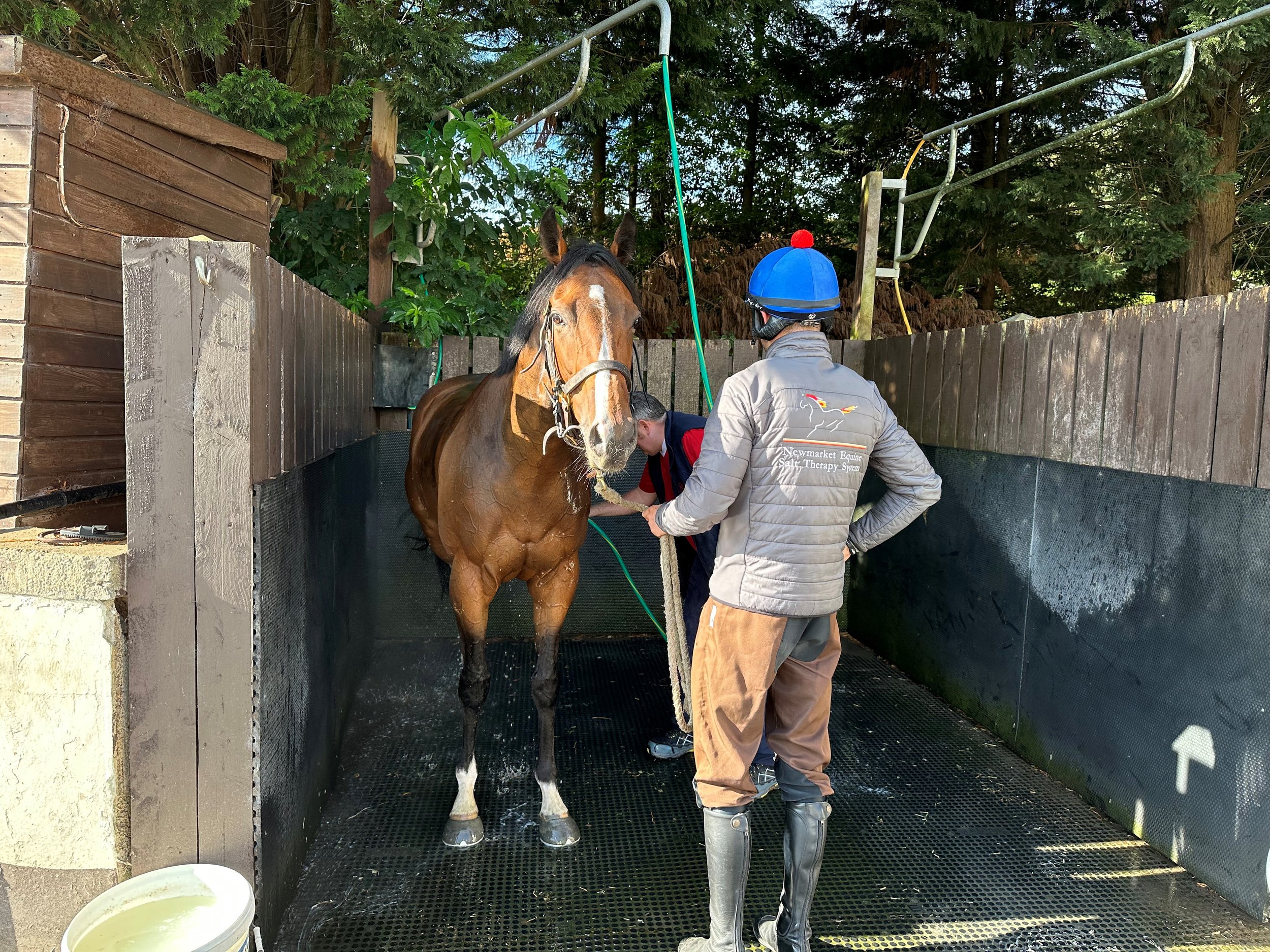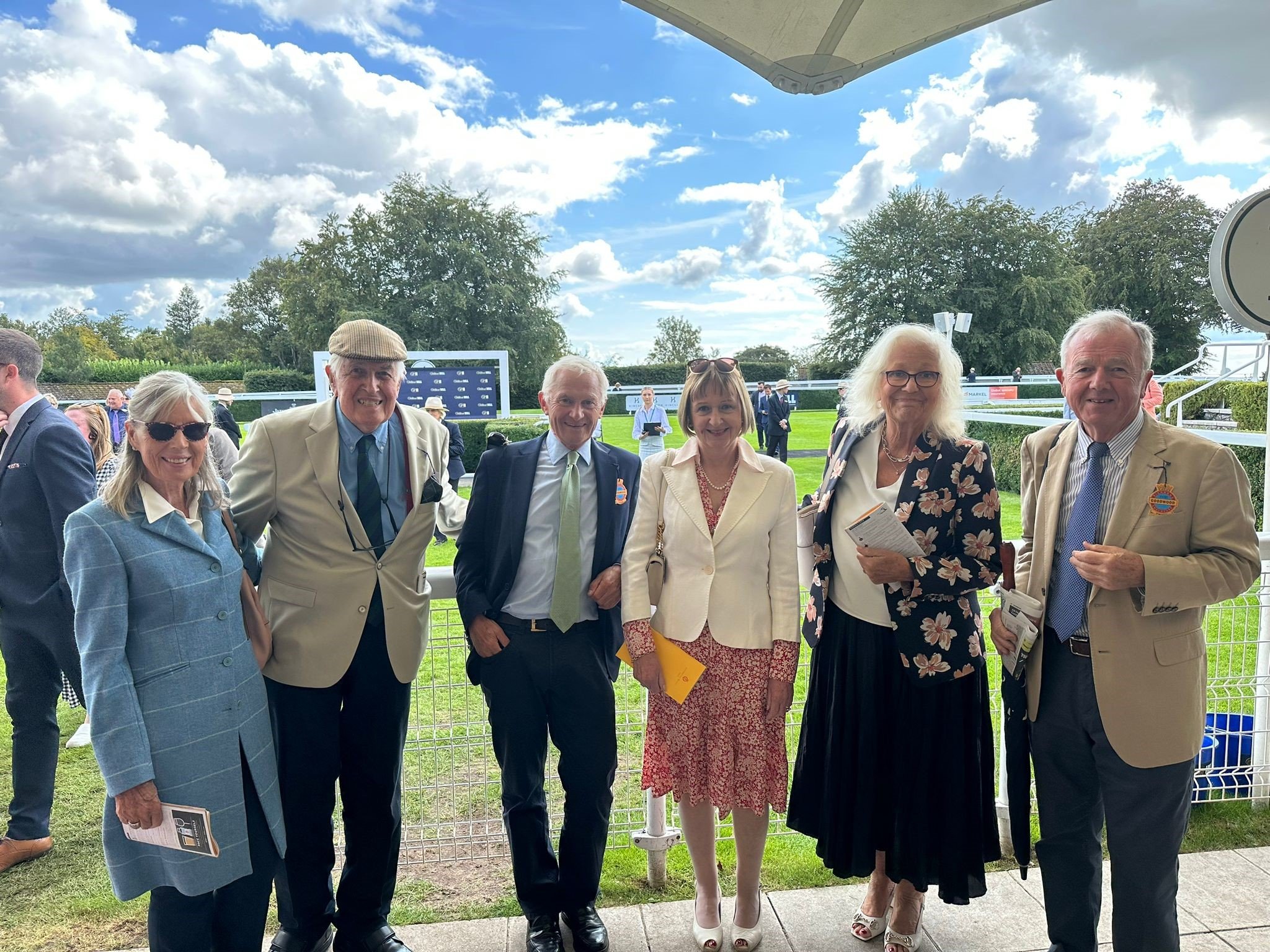AUGUST 2023
Defiance and his happy group of owners in the winner’s enclosure at Sandown following his debut victory
By Harry Herbert
The yearling buying season is upon us but sadly we couldn’t find anything at Doncaster so it’s on now to Goffs in Ireland and then to Tattersalls Books 1 and 2! We will of course keep everyone fully up to date as we buy and then the great reveal will be at our yearling parades on Sunday October 22nd and Monday 23rd.
Much will happen before then and what a week ahead we have with Soprano running in the Dick Poole (Gr 3) at Salisbury tomorrow preceded an hour before by Truthful in a Listed race at Longchamp. But it doesn’t stop there as both Believing and Spycatcher head to the Betfair Sprint Cup (Gr 1) on Saturday. Spycatcher will only run if the rains come but Believing is all set come rain or shine!
With runners a plenty too at Ascot in the shape of Pastiche, Vermilion, Atrium and Western it promises to be a seriously exciting week ahead. With Western we have an eye on the Goffs Million so we are hoping that he can book his ticket to the Curragh at the end of the month in that €500,000 to the winner race! Another we have eligible for the Million is Pianoforte who heads to Newcastle on Friday so all fingers and toes are well and truly crossed that we can be double handed at the Curragh.
Hopefully you will have received details on our new syndicates to race next year so do pencil yourself in for the one that suits you both trainer and budget wise. You can always change your mind at the yearling parades but book early to avoid disappointment!
With my best wishes,
Harry Herbert, Chairman
On The Track
By Emily Scott
Believing was back with a bang after a 77 day break to win the Flying Fillies’ Stakes (Listed) at Pontefract under a wonderfully timed ride from Danny Tudhope. She had to overcome a horrendous draw in stall ten, which caused her to be shuffled back to nearly last of the eleven runners. It is notoriously difficult to make up ground at Pontefract because they are constantly climbing and turning, especially over sprint distances. She still had plenty to do with 2f to run, but positively motored home in the straight to get up by a neck and I think she won with a bit in hand at the line. As Harry mentioned earlier, she has been supplemented for the Haydock Sprint Cup (Gr 1) on Saturday.
Believing getting up to win the Flying Fillies’ Stakes (Listed) at Pontefract
First time out 2yo winners are hard to come by and it was the Roger Varian trained Defiance who looked a bit special when winning a mile maiden at Sandown. He was out the back during the early part of the race and was given plenty of time to warm to the task under David Egan, but once he was pulled out to make a challenge he came home very strongly to get up by a short head. The second horse, Caviar Heights, has since won a Class 2 maiden at Goodwood which is a nice boost to the form and we hope to see Defiance out again in a couple of weeks time at Newbury where Roger is targeting him at the Haynes, Hanson & Clark novice, a £30,000 race for colts and geldings over a mile.
Defiance at full stretch to get up for victory on debut under David Egan
Another juvenile winner this month was the James Ferguson trained Drama who got off the mark at the second time of asking in a 6f novice at Windsor. He was ridden by William Buick and once again showed signs of greenness as he was a bit behind the bridle through the early stages, but once William got him rolling he surged clear to win with a degree of authority and looks a smart colt for the future. He went off a bit quick in his subsequent start in the £100,000 Tattersalls Somerville Stakes at Newmarket and finished a little tired, but I’m sure he’ll bounce back next time. He’s a big strong colt who will progress into next year as well.
Drama pricks his ears as he strikes the front under William Buick at Windsor
Ramensky made his last start for Highclere a winning one when taking the £20,000 seller at Goodwood. He had disappointed on two previous starts having looked quite exciting in the spring when winning on the all-weather. The horse was well in himself and so instead of head straight to a sale William picked out this race for him and he stormed to a 4 length victory under Tom Marquand! He was auctioned after the race and fetched a nice sum of £23,000 and apparently is heading to Emma Lavelle for new connections.
Ramensky wins at Goodwood under Tom Marquand
Syndicate In Focus
The Francisco Goya Syndicate
QUANTUM FORCE
(2yo b c - Land Force ex High Luminosity)
Quantum Force is a strapping colt by first season sire Land Force. He made a pleasing debut at Lingfield in late June where he was drawn wide and had a miserable trip before knuckling down well in the straight to finish fifth. He was given a short break after that race to fill his big frame and he is now back in full work. George is looking forward to galloping him soon and has picked out a 6f novice for him at Yarmouth in two weeks’ time.
TONIGHT
(2yo ch f - Waldgeist ex Leenavesta) - on the near side
Tonight is a gorgeous, long striding, scopey filly by another first season sire, Waldgeist, who is a son of the great Galileo. His progeny are no doubt going to be better as 3yos, but he did record his first 2yo winner last week. Tonight, who is trained in France by Nicolas Clement, is progressing well in her training and enjoyed a racecourse gallop at Chantilly last week. She is on track to make her debut in October.
Rolf’s Rambling’s
By Rolf Johnson
LITTLE by LITTLE – last of the bookmaking lone rangers
Stephen Little was a one-off. He and I go back a long way. In the Sixties’ as he was scrupulously ticking off the racecourses of Britain on his Raleigh Tourer ‘sit up and beg’ bicycle, I was taking the student’s route, cadging lifts hitch-hiking. We didn’t bump into one another until a decade later.
My peregrinations didn’t take me anywhere near as far as Stephen’s odyssey though unknown to either of us, we were among the masses at the last Manchester November Handicap in 1963; at Cheltenham the next year, among the Irish for the day of Arkle’s first Cheltenham Gold Cup; and not long after, Team Spirit’s Grand National. In 1970 Nijinsky’s historic Triple Crown in the St Leger at Doncaster confirmed, independently, that racing was our future.
Stephen has written “From Bicycle to Bentley” * a memoir of his journey from racing nut to freestanding bookmaker. It is the mark of respect of one doyen for another that in the book’s foreword Sir Mark Prescott observes: “I don’t suppose there will ever be another Stephen Little. The days of the independent bookmaker have long gone.”
Since Sir Mark regards Stephen’s work as “an important record of the times” who is to argue with the keeper of racing’s flame? The memoir will certainly find its place in racing’s Bodleian, Tim Cox’s library in Dorking.
Bookmakers are ‘the enemy’. At least you used to be able to see the whites of their eyes. Now faceless organizations employ manicured ‘influencers’ striding the advertising catwalk exhorting us to bet responsibly but “for heaven’s sake carry on punting; our bonuses depend on it.”
The ‘machine’, the exchanges, will win come rain or shine. The only threat to bookmaking profits, and specifically to racing’s teetering finances, is the 2023 Gambling Commission’s advocacy of “affordability checks”.
With the best of intentions, possibly, a Commission made up of people whose nearest relation to racing appears to have been that one of them was deputy chief Whip for his political party, have decreed social evil begins, and ends with gambling, totally disregarding a quote I repeat ad nauseam – Phil Bull’s “Having a bet is the last democratic act.”
Can you be a gentleman and a bookmaker at one and the same time? Those of us of an age may decide for themselves whether the likes of William Hill, Cyril Stein (Ladbrokes), Joe Coral, Victor Chandler, John Banks et al were gentlemen bookmakers. Hill’’ rails board bore the slogan “Courtesy, civility and integrity”: “Never a quarrel bet with Coral”: John Banks “Betting shops are a licence to print money” (Err, perhaps that last one isn’t the best example of a public service).
You can judge whether Stephen Little was the last of his ilk (he gave up his pitches in 1998) with the help of his entertaining, informative and trenchant opinions. Rare books are best handled with ‘kid gloves’. In my mind’s eye the pages of From Bicycle to Bentley would be turned by soft, white-gloved hands, with which tic-tacs of yesteryear would flash odds across the betting ring. Stephen Little belongs to that era.
At the heart of the ‘betting jungle’, as his friend the late John McCririck had it, Stephen scrapped with the best of them. The only reservation I heard from his clients was that he would be round like clockwork on Monday, at the races, distributing his batch of brown envelopes containing losing accounts: just occasionally, cheques for winners could be ‘in the post’. Still, his eagerness to ‘stand a lumpy bet’ while others ran for cover, drew a clientele of heavyweights such as JP McManus. We’re talking regular six-figure exchanges.
Stephen pulled off a combination of flamboyance and temperance. No cigar ever poked from the fire hazard he habitually wore – the pelt of a grizzly bear or a mammoth - yet he brayed his odds above the hubbub of the crowd. In our day the bogus ‘African’ Prince “I gotta horse” Monolulu gathered gullible punters for his spurious tips. Had they been contemporaries (Team Spirit’s was the ‘Prince’s’ last National) in the ‘betting jungle’, on the one hand Stephen would have drowned out the raucous tipster – while taking those dupe’s money with the other.
Stephen was uncompromising in reaching his goals. Had the ‘Rough Guide to Great Britain’ required a chapter on Youth Hostels, Stephen was the authority. Two shillings a night, out by ten, they were established in 1930 “to help all, especially young people of limited means, to greater knowledge, love and care of countryside”. Such ‘billets’ were a godsend to him and an early indication of the path that would lead to his championing of ‘country pursuits’ – notably hare coursing.
The great thing about Stephen was that he has never lost that idiosyncratic take on life. When he graduated from ‘bicycle to Bentley’, passing his test at the fourth attempt, he would insist on driving without a seat belt. His passengers – if slaves to convention - could wear one.
There were yet more ‘correspondences’ between us. Back in 1980 we slept under the blackjack table on the overnight Channel Islands ferry. Stephen had bought a filly, Hollow Tree, in Toby Balding’s stable where I worked. He had a yen for the Australian jockey Harriet Glen so she had the mount in (and the flight to) Jersey. There is a photo in Stephen’s book of his jockey with Hollow Tree in the Les Landes winner’s enclosure: my contribution? An arm, holding the filly. Harriet gave Hollow Tree a terrific ride – but that was as near as Stephen got.
Years later, I actually pencilled for him one day on the rails at Kempton. It was an education – how little I knew; how much he did.
And yet another was when Stephen began Coursing. He says: “I was originally suspected of being an ‘anti’”. Really? I suppose a tyro 24–year-old bookmaker with floppy hair coming from nowhere for his first Waterloo Cup in 1971 did stand out. On my coursing debut, not one of your typical yeoman country folk, gathered on a Domesday field at Finkley in Hampshire, Stephen introduced me to someone who was obviously primus into pares, the proconsular Sir Mark Prescott. The formidable baronet’s initial exchange was, yes, “Are you an anti?” On the nail – except by the end of the day I was a convert if not a disciple.
The athleticism of beautifully-trained dogs was matched by, and most often bettered by the hares. The red-coated slipper’s release of the dogs was balletic. But the debate about whether it was a justifiable sport was already lost. It was never a sport to some - not to its devotees who took delight in animals returning to nature, behaving as they would in the wild; or to its detractors, equally fervent and committed, who saw it as barbaric, full stop.
I do not regard Sir Mark or Stephen as barbaric. Stephen’s descriptions of coursing and his role in it are some of his book’s highlights. Coursing will not return but its demise might give food for thought, not least to those the next time they flatten a hare on the road.
He got out of the whole business before the rapacious exchanges took over and bookmaking became a zombie exercise. He fires extended bombardments of the National Joint Pitch Council (NJPC) his bête noire – “a bunch of know nothings” – who have overseen the obliteration of racecourse betting by taking matters out of bookmakers hands. He holds similar disdain for political interference. I was disappointed Stephen doesn’t apply his forensic bookmaking knowledge to the Gambling Commission’s findings: but not as much as I was that he was not invited to sit on it.
“When I came in, renewing licences – just a sheet of paper - cost £20 for three years. Now there are pages and pages of rules and regulations costing a fortune,” he said. No wonder bookmaking is a dying industry. If they didn’t allow one name to occupy four pitches (out of six) on the rails at Kempton for example, they wouldn’t have enough layers attending to be legal. R I P the Silver Ring; gawd help Tattersalls.
In a damning indictment on behalf of the ‘ring’ - fellow bookmakers who were just as much ‘the enemy’ as his punters - he said: “Bookmakers are just not appreciated any more as draws to the racecourse”: he absolves Edward Gillespie who “got it right at Cheltenham.”
And so Stephen Little ‘comes out’ about his association with racing. His book doesn’t disguise betting is in his DNA. A fire still burns, if no longer a wildfire, fanned by famous betting duels. “I’ve lost far more on other races than the two instances you mention, Frankie’s Malevolent, sorry Magnificent, Seven but I felt stitched up behind the scenes for the other one, at Chepstow (1995), Jibereen. There was a whitewash enquiry over that.
“Affordability checks? Outrageous!” (the word serves as a constant expletive). One has to remember what a singular individual Stephen is: there’s genuine feeling when he states that, “In thirty-five years with a licence to make a book I never thought I would need a licence to be a punter.” He’s referring of course to these misbegotten Affordability Checks which, when universally introduced, everybody will know everybody’s business – and those who don’t know the business, will sit in judgment.
“Cashless? Outrageous! They snatched my lunch back at Exeter when my money wasn’t accepted. Fortunately, I kept the pork chop. I haven’t been back.”
If not quite a chink of vulnerability, misread by some as sentimentality, he insists that genuine bookmakers had a ‘feel’ for the game. “I loved the atmosphere, the engagement, betting shops didn’t appeal (see John Banks). Racing was part of the nation’s daily round and meant one thing, horseracing. Nowadays when they say ‘racing’ it can mean anything – motor, pigeon, cycle...”
Stephen still occasionally stands at local tracks, on behalf of another bookmaker. He could probably cycle to them - Bath, Salisbury, if he chose. But as Sir Mark, who has known him for fifty years, said of this son of the turf and a Lincolnshire vicar who made his first book at Uppingham School at the age of 12, and whose like we shall not see again, “Stephen stood alone.”
*From Bicycle to Bentley. A Bookmaker’s Story by Stephen Little. Published by Pen & Sword Books (2023).
Clodagh’s Recipe
Summer Berry Trifle
Serves 8
INGREDIENTS:
450g fresh blueberries
400g fresh raspberries
5g caster sugar
3 tablespoons crème de cassis (optional)
200g madeira cake, sliced
250ml mascarpone cheese
500ml tub custard
1 tbsp vanilla extract
300ml double cream, softly whipped
METHOD:
1. Place the 2/3 of each of the berries and sugar in a saucepan over a low heat and simmer for 2 minutes, then pour in thecrème cassis and set aside to cool.
2.Place a layer of the madeira cake at the bottom of a large trifle bowl, and spoon the berry mix on top.
3. In a mixing bowl whisk together the mascarpone, vanilla extract and custard until smooth but make sure it doesn’t get to runny, you want it to remain slightly thick. Spoon on top of the cake and berries, followed by the softly whipped cream.
4. Chill for a couple of hours in a fridge and just before you serve decorate the top of the trifle with the reaming blueberries and raspberries.
Where are they now?
THUNDEROUS
Thunderous was a fantastic racehorse for his owners, coming back from multiple injuries throughout his career to compete at the top level. He won four of his seventeen starts, earning more than £200,000 in prize money. His biggest win came in the Dante Stakes (Gr 2) in 2020 and arguably his best effort came when finishing a length behind Stradivarius in the Yorkshire Cup (Gr 2) last May. We were hoping to keep him in training as a 6yo this season, but unfortunately he damaged a suspensory ligament in February and so time was called on his career as a racehorse. His groom Molly had formed a strong bond with Thunderous over the years and so it was decided that he should be gifted to her in his retirement. He completed his rehab with the Johnston’s before moving to Molly a month ago and the pair are having a great time!
Taittinger Moment
MARY NEALE
This month’s Taittinger Moment has been awarded to Mary Neale (pictured receiving her magnum from Harry) who record her 100th winner as an owner when Believing stormed to victory at Pontefract in the Flying Fillies’ Stakes (Listed) at Pontefract last month! Mary, who has been a Highclere owner for many years, said the majority of her winners have been with Highclere and she looks set for more success with a lovely bunch of Flat and National Hunt horses to go to war with.
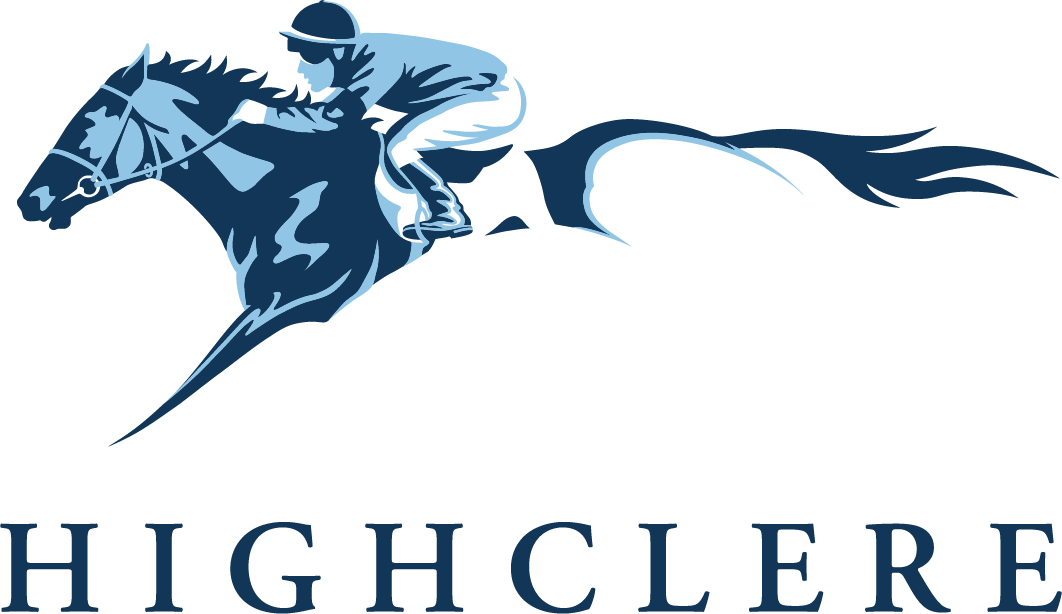





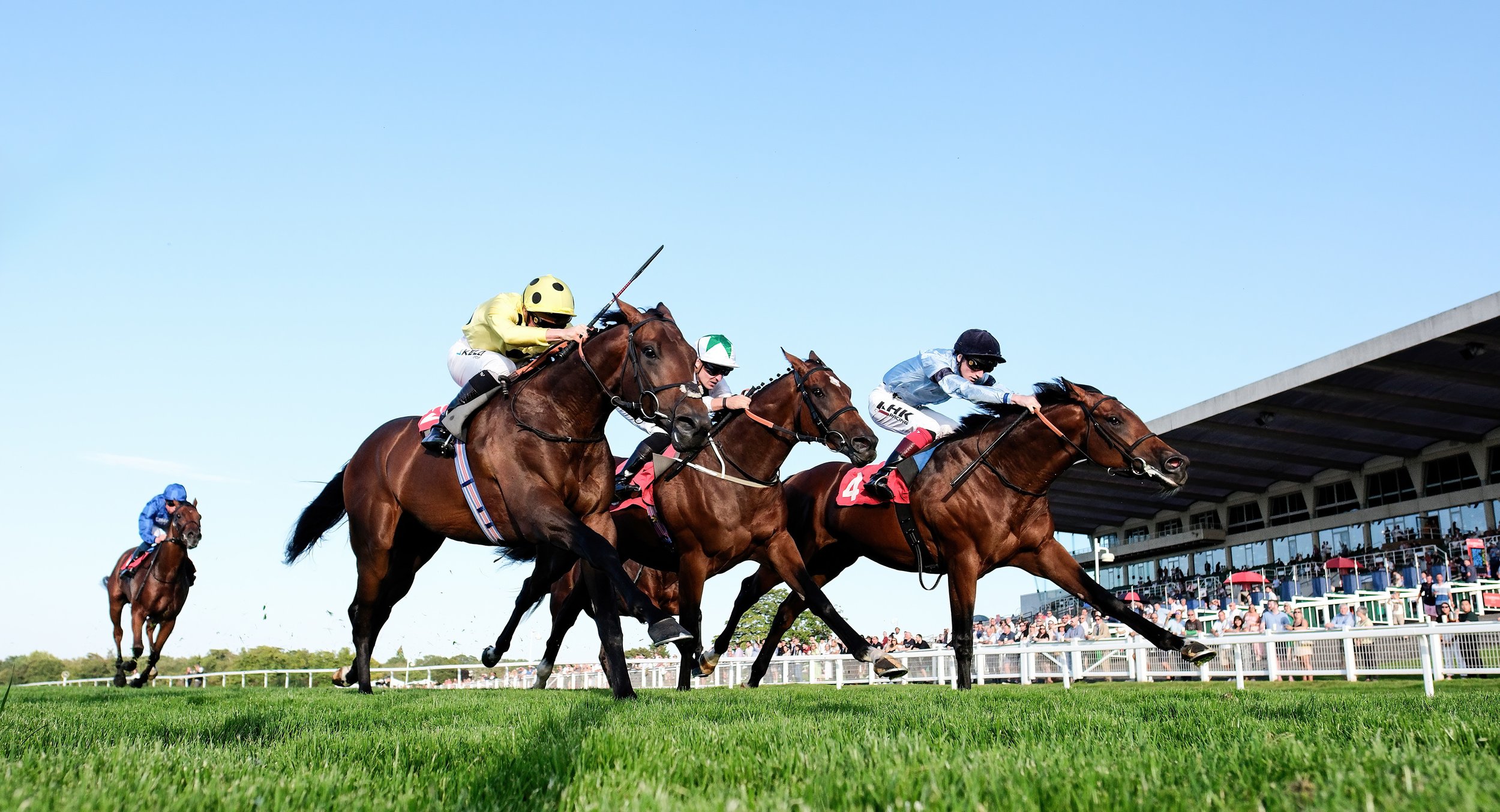




![Rolf[69].jpg](https://images.squarespace-cdn.com/content/v1/61f12359c76c4c234ba9a355/1671720372982-05Q1VND86OGEQX6N2E4W/Rolf%5B69%5D.jpg)


